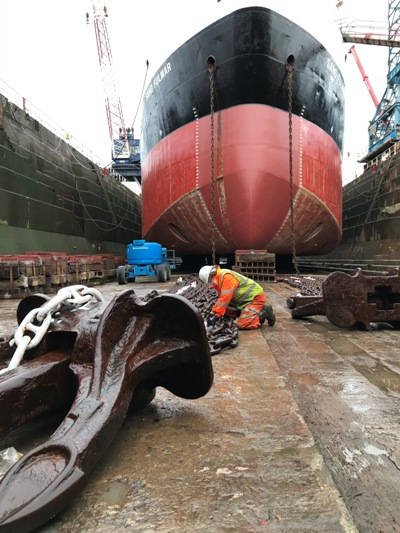The UK Marine team has been working with the Merchant Navy Training Board and Cadet Management Companies to provide cadets with training berths onboard the Sand Heron, Sand Falcon and Sand Fulmar, after their normal training plans were disrupted by Coronavirus.
The cadets’ employers have been unable to fulfil their usual commitments because of the downturn of the cruise ship industry as a result of the pandemic. Joining our ships will allow the cadets to secure their required sea time, complete their training requirements and ultimately become qualified merchant navy officers. These cadets will be with our crews for three months.
We caught up with one of the cadets, Henry Wallace, and Captain Tony Surey on the Sand Fulmar:
Henry, 32, joined the crew of the Sand Fulmar in November to complete the final part of his officer cadet training which includes five phases – two at sea and three at college. If he passes he will then become a 2nd Officer. Slightly unusually he changed careers from being a primary school teacher a couple of years ago. He had friends in the marine world and decided that it was what he wanted to do next. He was lucky enough to secure a place at Warsash Maritime Academy in Southampton and sponsorship to fund his training from company, SSTG, financed by the Maritime Educational Fund.
We asked Henry how he was finding life on board a ‘working’ vessel compared to a ‘leisure’ vessel such as the usual cruise ships that cadets train on:
“I much prefer working with CEMEX and the Sand Fulmar compared to previous leisure vessels, it is definitely my favourite ship so far. It’s refreshing as the crews are more down to earth and happy to help out. From a training point of view, it is better as I have to do a lot more on a dredger.
Being in coastal waters there is more navigation and hands-on work. Working on the bridge is more interesting as we have to moor, dredge and discharge several times during a stint on board. As you can imagine on a cruise ship you can go for days without seeing another vessel. The crews on a large cruise ship are inevitably a lot more segregated and split into very specific roles – you don’t even get to meet all the crew.
I was really lucky that CEMEX stepped in to help with my sea time. I was sitting at home during lockdown wondering how I was going to finish my training as all the cruise ships are anchored up and not taking passengers. I have had six weeks on board the Sand Fulmar already and hope to fit in another 12 weeks before the end of my training in April.”
We then asked Henry what he does on board in his down time?
“I go to the gym quite a lot (it’s only basic!) and have my Kindle so have been reading a few novels. Of course, I still have to study as well. DVDs and Netflix also come in handy!”
We look forward to catching up with Henry later in his training to find out how he is getting on.
Tony Surey, Captain of the Sand Fulmar, also spoke to us and told us why it is so important for companies such as ours to support cadets in this way:
“You sometimes hear it said that the UK is a maritime nation. Years ago, this was true in all respects, but now sadly seafaring in this country is a little known and little advertised vocation. It is with some degree of satisfaction then that CEMEX UK Marine is helping to at least slow this trend by helping to train cadets with a view to them becoming Merchant Navy officers.
I think it reasonable to say that most people established in their career are happy to pass on knowledge which they may have gleaned, particularly to those who are keen to learn. But I find that the benefit of training others is reciprocated; it keeps you on your toes! Whilst some knowledge becomes so ingrained, it’s the maritime equivalent to never forgetting how to ride a bike, an inquisitive cadet can quickly show you where you have let inertia set in or allowed the memory to lapse. Additionally, for us, there is the gratification of helping someone achieve a qualification and make a start as a Ships Officer.
It would be nice to think that Henry, once qualified, will work for CEMEX, but wherever he ends up, we wish him well.”
